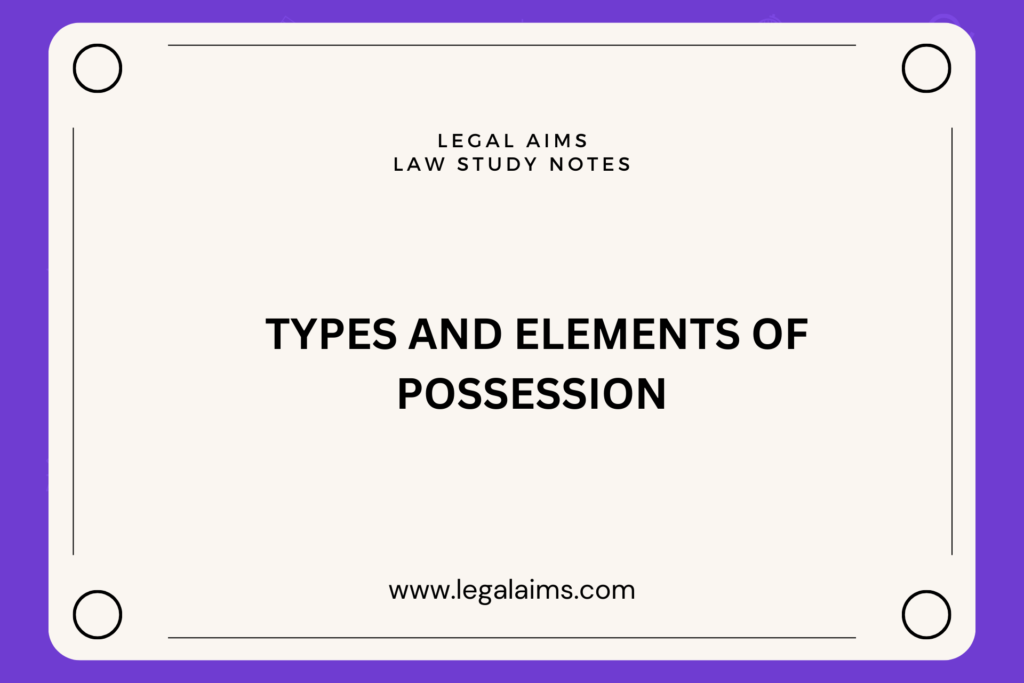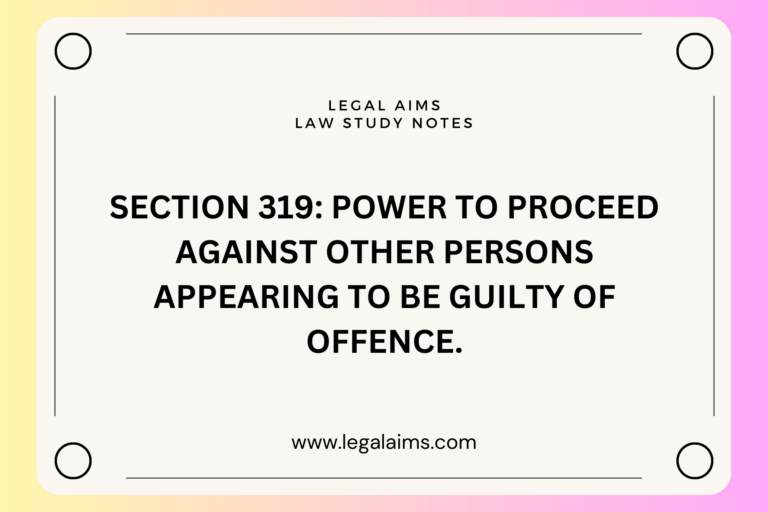types and elements of possession
Introduction
In the realm of jurisprudence, the concept of possession plays a pivotal role in defining and understanding property rights. Possession is a multifaceted legal concept that encompasses various dimensions, from the types and elements of possession to the theories that underpin its legal significance. Furthermore, it is essential to differentiate between ownership and possession, as they are distinct legal concepts with their own set of rights and responsibilities. In this article, we will explore the various aspects of possession in jurisprudence, including its types, elements, theories, and the crucial distinctions from ownership.
Possession [ possession or besitz]:
- Maine defines “possession as physical detention coupled with the intention to hold the thing detained as one’s own”.
- According to SALMOND possession of the material object is the continuing exercise of a claim to the exclusive use of it.
- Section 110 of the INDIAN Evidence Act 1872 states that who has possession of the property, is the owner of the property burden of proof lies upon the person who is claiming prospective ownership.
- Possession is evidence of ownership.
Elements of possession
- The corpus possession or physical element or the thing possessed or objective.
- The animus Domini or the intention or mental or subjective element.
1.The corpus possessionis :
- Corpus implies two things:
- Possessor’s physical relation to the object.
- Relation of the possessor to the rest of the world.
- There must be some physical contact of a person with the thing which he possesses so as to give rise to a reasonable assumption that others will not interfere with it.
- The assurance of non-interference can be secured in the following ways:
- The physical power of the possessor.
- Personal presence of the possessor.
- The protection afforded by the possessor.
2. Animus Possidendi :
- It implies the intention to appropriate to oneself the exclusive use and enjoyment of the thing possessed.
- It is the conscious intention of the possessor to exclude others from interfering with his right of possession.
3. Theories of possession:
- Savigny’s theory :
- He emphasized that possession has two basic elements:
- Corpus possessions.
- Animus Domini.
CRITICISM :
- Savigny has not taken that the law does not protect a possession that is acquired unlawfully.
- Savigny’s idea of animus Domini, the intention to hold as owner fails to explain the cases of the pledges, who have possession but do not intend to hold as owners.
2. Ihering’s theory:
- Ihering says that whenever a person looked like an owner in relation to a thing, the had possession of it unless possession was denied to him by rules of law based on practical convenience.
CRITICISM:
It fails to explain the cases where the law refused possessory rights to persons who were ineffective physical control of the thing possessed.
3. Salmond theory :
- Salmond observed that there is only one concept which is a possession, in fact, he denied possession in law.
CRITICISM :
- Mark criticized his theory and says that law treats possession not merely as a physical condition but also as a right.
4. Kant’s theory:
- Holland’s theory of possession is founded on the preservation of peace in society.
Kinds of preservation:
1. Corporal and incorporal possession:
- Corporal possession is a possession of material things like land, house, etc.
- Incorporal possession is a possession of immaterial things like copyright, trademark, etc.
2. Mediate and immediate possession :
- Mediate possession is a possession of things through another person.
Salmond points out three categorized of mediate possession-
- Possession acquired through an agent.
- Possession held through a borrow.
- Possession lent for a fixed period of time.
- Immediate possession is known as direct possession.
3. Concurrent or duplicate possession:
Concurrent or duplicate possession is when two or more person possesses in common the same thing at the same time, but their claims are not adverse to each other.
4. Adverse possession:
Adverse possession means possession by a person initially holding the land on behalf of another person and subsequently setting up his own claim as a true owner of that land.
5. Constructive possession:
Constructive possession means having power and the intention of retaining control over the property but without actual control.
Importance:
- Possession is the prima facie evidence of ownership.
- Possession is helpful in maintaining peace and order.
- Protection of possession is necessary to prohibitory.
Types of Possession in Jurisprudence
Possession in jurisprudence can be categorized into three main types:
Actual Possession: This type of possession refers to physical control or occupation of a property or object. The person exercising actual possession is in direct physical contact with the property and has the ability to use, enjoy, and control it. For instance, a homeowner living in their house is in actual possession of the property.
Constructive Possession: Constructive possession occurs when an individual has control and authority over an object or property, even if they are not physically present at the location. This often applies to situations where multiple parties have a shared interest in the same property, such as joint bank account holders or co-owners of a business.
Adverse Possession: Adverse possession arises when an individual gains legal ownership of property by openly and notoriously occupying it for a specified period, typically without the owner’s permission. The claimant must meet certain criteria, such as continuous possession and hostility towards the true owner’s rights, to acquire the property through adverse possession.
Elements of Possession in Jurisprudence
To establish possession in jurisprudence, certain elements must be present:
Intention: The possessor must have the intention to possess and control the property or object. This element helps differentiate between mere presence and actual possession.
Physical Control: Possession often involves physical control or occupation of the property. This means that the possessor has the ability to use, manage, and exclude others from the property.
Duration: The possession must be continuous and uninterrupted for a certain period. The length of this period can vary depending on jurisdiction and the type of property in question.
Knowledge: The possessor should be aware of their possession and exercise control over the property knowingly.
Theories of Possession in Jurisprudence
Jurisprudence offers various theories to explain the legal significance of possession:
Fiction Theory: This theory considers possession as a legal fiction used to simplify property laws. It assumes that the possessor is the owner and places the burden of proof on anyone challenging this presumption.
Functionalist Theory: According to this theory, possession serves a functional purpose in society by allowing individuals to use and control property. It ensures efficient resource allocation and encourages responsible property management.
Sociological Theory: This theory views possession as a social construct influenced by societal norms and values. It recognizes the role of possession in shaping social relations and property rights.
Ownership vs. Possession in Jurisprudence
Ownership and possession are distinct legal concepts, and understanding their differences is crucial:
Ownership: Ownership confers the absolute right to use, enjoy, and dispose of property. It represents the highest form of property interest, often accompanied by legal title and exclusive rights.
Possession: Possession refers to physical control and occupation of property without necessarily implying ownership. Possessors may have limited rights compared to owners and may not have the authority to transfer ownership.
In essence, ownership is the legal title to property, while possession relates to the physical control and occupation of property.
Ownership grants more comprehensive rights, including the ability to transfer property, whereas possession primarily concerns the current use and control of property.
Read More: kinds of liabilities in jurisprudence




Thanks for sharing this informative article about Eelements of Possession || Jurisprudence.